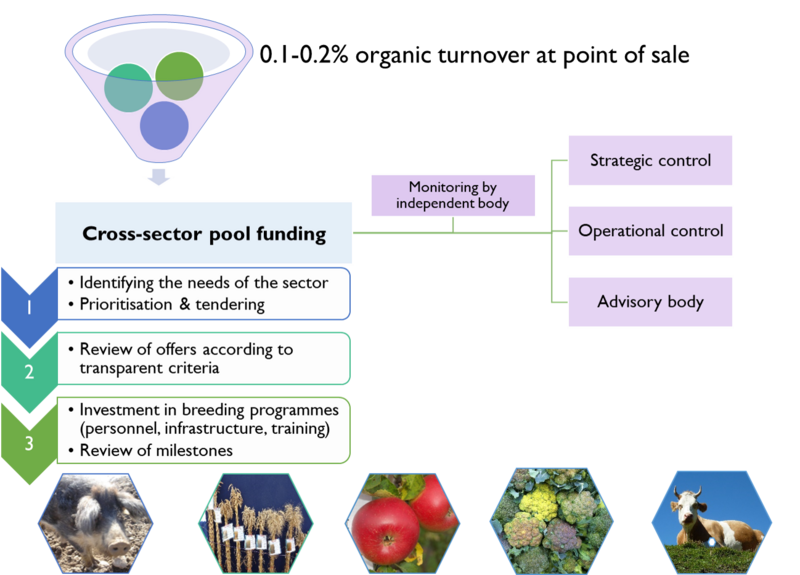Existing organic breeding initiatives are currently characterized by chronic underfunding. An improvement in the financial basis of organic breeding is urgently needed
An initial cross-sector pool funding concept was developed during a multi-step stakeholder dialogue activated within the organic seed and breeding sector with the objective to boost value chain collaborations. This concept was developed in a previous project by FiBL in Gemany and Switzerland on demand of BÖLW.
ENGAGEMENT.BIOBREEDING EUROPE will continue the dialogue on the cross-sector pool funding strategy for developing framework conditions that can be useful in different regions of Europe. We study different organic plant and animal breeding projects including value chain collaborations, document the evolvement of such initiatives, their governance, economic situation, and the impact of cultivars and animal breeds derived from these initiatives on the organic sector. This analysis will provide improved understanding on bottlenecks and success factors for cross-sector iinvestments in organic breeding. We will summarize the results in fact sheets for different organic breeding financial models designed with value chain actors’ collaboration.
Framework criteria for cross-sector pool funding strategy

- Integrated concept for animal and plant breeding
The high demand for organic breeding exists equally in animal and plant production. The pool funding strategy should facilitate the development of an integrated concept for animal and plant breeding which avoids competition and promotes cooperation between both organic breeding sectors.
- IInclusion of the entire value chain
Without the participation of the entire industry, the financing system will not be able to develop the necessary strength. A voluntary, donation-oriented levy is not sufficient, because it would neither guarantee the necessary financial volume nor the commitment and longevity needed for organic breeding.
- Per mille of turnover at point of sale
Licences at farm level or at different product level of the value chain lead to distortions of competition or disproportionate price increases. Therefore, a flat rate of 1 to 2 per mille of total organic market turnover at the point of sale is proposed for promoting the participation of the entire organic industry.
- Credit and acquisition of other funding sources
The commitment which many trading companies in the organic sector are already showing through donations to organic breeding is expressly welcomed and should not be impaired by this concept. The financial resources already contributed by the company in the non-profit sector can be taken into account when paying the lump sum, so that existing and well-functioning structures are not curtailed. By creating a kind of "transparency point", funding contributions already made can be credited (e.g. via blockchain).
- Transparency and coordination for priorities setting and funds distribution
An independent coordination office should be set up for the allocation and management of funds, ensuring transparency.
- Boosting new initiatives and breeding sites
With the financial increase young breeders and new breeding initiatives can be promoted, which work on need-oriented not already targeted crops or animal species.
- Cooperation with other public and private breeding activities
New sources of funding and resources that have not yet been made available can also be tapped. In particular, more public funding could be sourced through an increase in the number of breeders' staff, if there is evidence of financial participation by the sector. Increased cooperation between organic breeders and actors from the conventional sector, both in the animal and plant sector, can create new synergies. By forging and maintaining alliances, e.g. with animal protection organisations, breeding associations and other breeders' organizations that do not use breeding methods that judged critical by the organic sector, existing networks can be strengthened, expanded professionally and the efficiency of organic breeding can be boosted.
- Awareness-raising and communication
The communication of the commitment towards organic breeding and the reasons for this choice should be shared with consumers. The use of simple slogans, such as "We promote organic breeding", could strengthen the competitiveness and meet customers' expectations for fully independent organic production without distorting the market.
 tap and then scroll down to the Add to Home Screen command.
tap and then scroll down to the Add to Home Screen command.